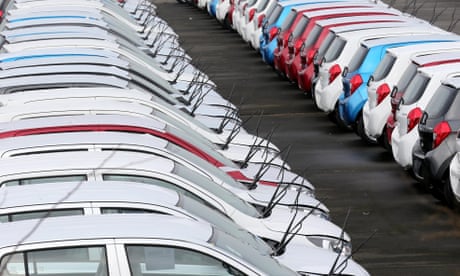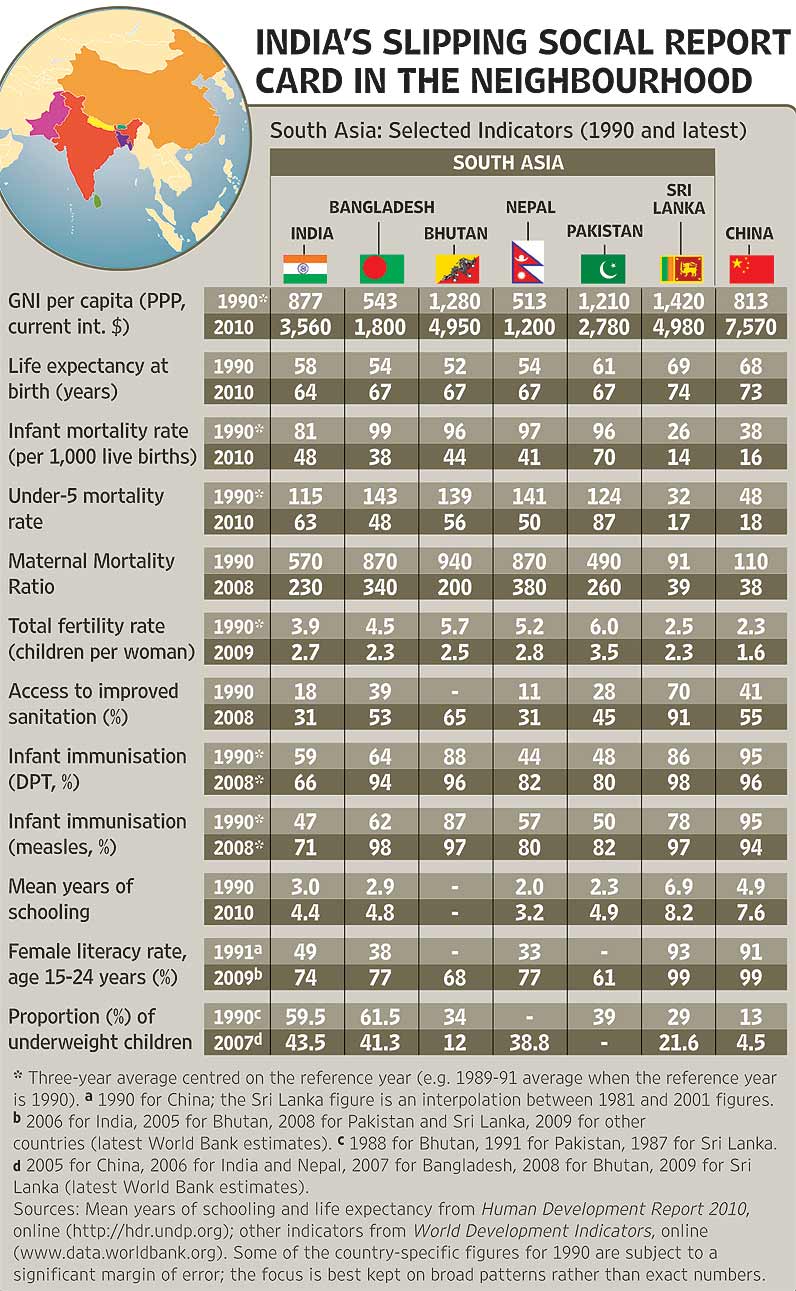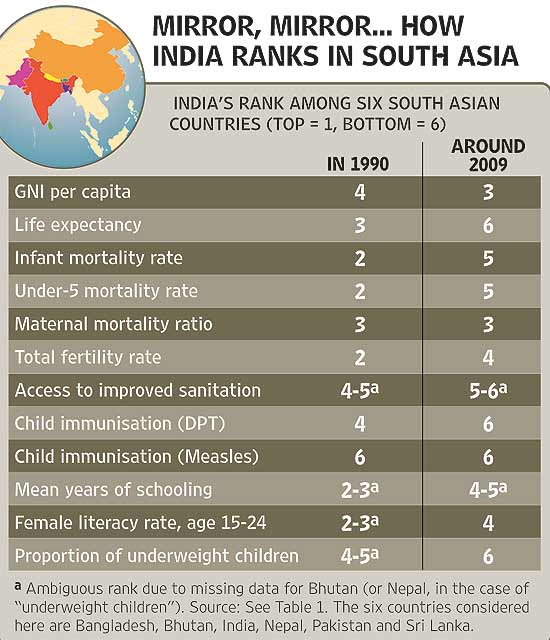It has to be but a means to development, not an end in itself
Is
India doing marvellously well, or is it failing terribly? Depending on
whom you speak to, you could pick up either of those answers with some
frequency.
One story, very popular among a minority but a large enough
group—of Indians who are doing very well (and among the media that cater
largely to them)—runs something like this. “After decades of mediocrity
and stagnation under ‘Nehruvian socialism’, the Indian economy achieved
a spectacular take-off during the last two decades. This take-off,
which led to unprecedented improvements in income per head, was driven
largely by market initiatives. It involves a significant increase in
inequality, but this is a common phenomenon in periods of rapid growth.
With enough time, the benefits of fast economic growth will surely reach
even the poorest people, and we are firmly on the way to that.” Despite
the conceptual confusion involved in bestowing the term ‘socialism’ to a
collectivity of grossly statist policies of ‘Licence raj’ and neglect
of the state’s responsibilities for school education and healthcare, the
story just told has much plausibility, within its confined domain.
But looking at contemporary India from another angle, one could
equally tell the following—more critical and more censorious—story:
“The
progress of living standards for common people, as opposed to a
favoured minority, has been dreadfully slow—so slow that India’s social
indicators are still abysmal.” For instance, according to World Bank
data, only
five countries outside Africa (Afghanistan, Bhutan,
Pakistan, Papua New Guinea and Yemen) have a lower “youth female
literacy rate” than India (
World Development Indicators 2011, online). To take some other examples, only
four countries (Afghanistan, Cambodia, Haiti, Myanmar and Pakistan) do worse than India in child mortality rate; only
three have lower levels of “access to improved sanitation” (Bolivia, Cambodia and Haiti); and
none
(anywhere—not even in Africa) have a higher proportion of underweight
children. Almost any composite index of these and related indicators of
health, education and nutrition would place India very close to the
bottom in a ranking of all countries outside Africa.
Growth and Development
So which of the two stories—unprecedented success or extraordinary
failure—is correct? The answer is both, for they are both valid, and
they are entirely compatible with each other. This may initially seem
like a bit of a mystery, but that initial thought would only reflect a
failure to understand the demands of development that go well beyond
economic growth. I
ndeed, economic growth is not constitutively the same
thing as development, in the sense of a general improvement in living
standards and enhancement of people’s well-being and freedom. Growth, of
course, can be very helpful in achieving development, but this requires
active public policies to ensure that the fruits of economic growth are
widely shared, and also requires—and this is very important—making good
use of the public revenue generated by fast economic growth for social
services, especially for public healthcare and public education.
|
|
|
| The minority of the better-off forgets that even after 20 years of growth, India’s among the world’s poorest nations. |
|
|
|
|
|
We referred to this process as “growth-mediated” development in our 1989 book,
Hunger and Public Action.
This can indeed be an effective route to a very important part of
development; but we must be clear about what can be achieved by fast
economic growth on its own, and what it cannot do without appropriate
social supplementation. Sustainable economic growth can be a huge force
not only for raising incomes but also for enhancing people’s living
standards and the quality of life, and it can also work very effectively
for many other objectives, such as reducing public deficits and the
burden of public debt. These growth connections do deserve emphasis, not
only in Asia, Africa and Latin America, but also very much in Europe
today, where there has been a remarkable lack of understanding of the
role of growth in solving problems of debt and deficit. There is a
tendency to concentrate only on draconian restrictive policies to cut
down public expenditure, no matter how essential and no matter how these
policies kill the goose that lays the golden egg of economic growth.
There is a neglect of the role of economic growth in economic and
financial stability in the European debate, with its focus only on
cutting public expenditure to satisfy the market and to obey the orders
of credit rating agencies.
Yet it is also important to recognise that the impact of economic
growth on living standards is crucially dependent on the nature of the
growth process (for instance, its sectoral composition and employment
intensity) as well as of the public policies—particularly relating to
basic education and healthcare—that are used to enable common people to
share in the process of growth. There is also, in India, an urgent need
for greater attention to the destructive aspects of growth, including
environmental plunder (e.g. through razing of forests, indiscriminate
mining, depletion of groundwater, drying of rivers and massacre of
fauna) and involuntary displacement of communities—particularly adivasi
communities—that have strong roots in a particular ecosystem.
|
|
|
| The European debate focuses only on curbing public spend, ignoring the role of economic growth in financial stability. |
|
|
|
|
|
India’s
growth achievements are indeed quite remarkable. According to official
data, per capita income has grown at a compound rate of close to five
per cent per year in real terms between 1990-91 and 2009-10. The more
recent rates of expansion are faster still: according to Planning
Commission estimates, the growth rate of GDP was 7.8 per cent in the
Tenth Plan period (2002-03 to 2006-07) and is likely to be around 8 per
cent in the Eleventh Plan period (2007-08 to 2011-12). The “advance
estimate” for 2010-11 is 8.6 per cent. These are, no doubt, exceptional
growth rates—the second-highest in the world, next to China. These
dazzling figures are, understandably, causing some excitement, and were
even described as “magic numbers” by no less than Lord Meghnad Desai,
who argued, not without irony, that whatever else happens, “the
government can still sit back and say 8.6 per cent”.
India does need rapid economic growth, if only because average
incomes are so low that they cannot sustain anything like reasonable
living standards, even with extensive income redistribution. Indeed,
even today, after 20 years of rapid growth, India is still one of the
poorest countries in the world, something that is often lost sight of,
especially by those who enjoy world-class living standards thanks to the
inequalities in the income distribution. According to
World Development Indicators 2011,
only 16 countries outside Africa had a lower “gross national income per
capita” than India in 2010: Afghanistan, Bangladesh, Cambodia, Haiti,
Iraq, Kyrgyzstan, Lao, Moldova, Nepal, Nicaragua, Pakistan, Papua New
Guinea, Tajikistan, Uzbekistan, Vietnam and Yemen. This is not exactly a
club of economic superpowers.
|
|
|
| Bangladesh and Nepal do not have India’s per capita income but have vastly improved indices. |
|
|
|
|
|
Having
said this, it would be a mistake to “sit back” and rely on economic
growth per se to transform the living conditions of the unprivileged.
Along with our discussion of “growth-mediated” development, in an
earlier book, we also drew attention to the pitfalls of “unaimed
opulence”—the indiscriminate pursuit of economic expansion, without
paying much attention to how it is shared or how it affects people’s
lives. A good example, at that time (in the late 1980s), was Brazil,
where rapid growth went hand in hand with the persistence of massive
deprivation. Contrasting this with a more equitable growth pattern in
South Korea, we wrote “India stands in some danger of going Brazil’s
way, rather than South Korea’s”. Recent experience vindicates this
apprehension. Interestingly, in the meantime, Brazil has substantially
changed course, and adopted far more active social policies, including a
constitutional guarantee of free and universal healthcare as well as
bold programmes of social security and economic redistribution (such as
Bolsa Familia). This is one reason why Brazil is now doing quite well,
with, for instance, an infant mortality rate of only 9 per 1,000
(compared with 48 in India), 99 per cent literacy among women aged 15-24
years (74 per cent in India), and only 2.2 per cent of children below
five being underweight (compared with a staggering 44 per cent in
India). While India has much to learn from earlier experiences of
growth-mediated development elsewhere in the world, it must avoid
unaimed opulence—an undependable, wasteful way of improving the living
standards of the poor.
India’s Decline in South Asia
One indication that something is not quite right with India’s
development strategy is the fact that India has started falling behind
every other South Asian country (with the partial exception of Pakistan)
in terms of social indicators, even as it is doing so well in terms of
per capita income (see table below).
|
|
|
| Seeing its neighbours, India’s poor could well wonder what economic growth has got them. |
|
|
|
|
|
The
comparison between Bangladesh and India is a good place to start.
During the last 20 years or so, India has grown much richer than
Bangladesh: per capita income was estimated to be 60 per cent higher in
India than in Bangladesh in 1990, and 98 per cent higher (about double)
in 2010. But during the same period, Bangladesh has overtaken
India in terms of a wide range of basic social indicators: life
expectancy, child survival, fertility rates, immunisation rates, and
even some (not all) schooling indicators such as estimated “mean years
of schooling”. For instance, life expectancy was estimated to be four
years longer in India than in Bangladesh in 1990, but it had become
three years
shorter by 2008. Similarly, the child mortality
rate was estimated to be about 24 per cent higher in Bangladesh than in
India in 1990, but it was 24 per cent
lower in Bangladesh in
2009. Most social indicators now look better in Bangladesh than in
India, despite Bangladesh having barely half of India’s per capita
income.
No less intriguing is that Nepal also seems to be catching up rapidly
with India, and even overtaking India in some respects. Around 1990,
Nepal was way behind India in terms of almost every development
indicator. Today, social indicators for both countries are much the same
(sometimes a little better in India still, sometimes the reverse), in
spite of per capita income in India being about
three times as high as in Nepal.
To look at the same issue from another angle, Table 2 displays
India’s “rank” among South Asia’s six major countries (excluding tiny
Maldives), around 1990 as well as today (more precisely, in the latest
year for which comparable international data are available). As
expected, in terms of per capita income, India’s rank has improved—from
fourth (after Bhutan, Pakistan and Sri Lanka) to third (after Bhutan and
Sri Lanka). But in most other respects, India’s rank has
worsened,
in fact, quite sharply in many cases. Overall, India had the best
social indicators in South Asia in 1990, next to Sri Lanka, but now
looks
second-worst, ahead of only Pakistan. Looking at their
South Asian neighbours, the Indian poor are entitled to wonder what they
have gained—at least so far—from the acceleration of economic growth.
India and China
One of the requirements of successful growth-mediated development is
the skilful use of the opportunities provided by increasing public
revenue. There are interesting and important contrasts in the policies
followed by different countries in this respect. Since China is often
cited by advocates of a single-minded focus on economic growth, it is
interesting to compare what China does with what India has been doing.
China makes much better use of the opportunities offered by high
economic growth to expand public resources for development purposes. For
example, government expenditure on healthcare in China is nearly four
times that in India (after adjusting for “purchasing power parity”—the
gap is even larger otherwise). China does, of course, have a larger
population and a higher per capita income than India, but even as a
ratio of GDP, public expenditure on health is much higher in China
(about 2.3 per cent) than in India (around 1.4 per cent).
|
|
|
| The RTI Act may not apply to information with private corporations but it can help contain the state-corporate nexus. |
|
|
|
|
|
As
Table 1 illustrates, China has much higher values of most social
indicators of living standards, such as life expectancy (73 years in
China and 64 years in India), infant mortality rate (16 per thousand in
China and 48 in India), mean years of schooling (estimated to be 7.6
years in China, compared with only 4.4 years in India), or the coverage
of immunisation (very close to universal in China but only around
two-thirds in India, for DPT and measles). While India has nearly caught
up with China in terms of the rate of economic growth, it seems quite
far behind China in terms of the use of public resources for social
support, and correspondingly, it has not done nearly as well in
translating growth into rapid progress of social indicators. While there
are also, undoubtedly, other factors behind the China-India contrast,
the differing use of the fruits of growth for social support would seem
to be an important influence in this contrasting picture.
It is not at all our purpose to argue that India should learn from
China in every respect. India has reasons to value its democratic
institutions. Even with all their limitations, these institutions allow
for a wide variety of voices to be heard, and facilitate significant
opportunities for various forms of public participation in governance.
There are, of course, many failings of Indian democracy (which we have
discussed in our writings), but there are big democratic achievements as
well, and also the hindrances can be addressed through democratic
battles to remove them. If China officially executes more people in a
week than India has done since Independence (and this is true of a
shockingly large number of weeks every year in China), this comparison,
like many others involving legal and human rights of citizens, is not to
India’s disadvantage. If there is something to learn from China,
especially about how to ensure that the fruits of economic growth are
more widely shared, then that is a case for learning from what there is
to learn, not a case for blind imitation.
|
|
|
| Not even one of the 315 editors and senior leaders of the print and electronic media in a survey were SC or ST. |
|
|
|
|
|
The
China-India contrast does, however, raise another interesting question:
could it be that India’s democratic system is a barrier to using the
fruits of economic growth for the purpose of enhancing health, education
and other aspects of “social development”? In addressing this question,
there is some possibility of a sense of nostalgia. When India had a
very low rate of economic growth, a common argument coming from the
critics of democracy was that democracy was hostile to fast economic
growth. It was hard, at that time, to convince the anti-democratic
advocates that fast economic growth depends on the friendliness of the
economic climate, rather than on the fierceness of political systems.
That debate on the alleged contradiction between democracy and economic
growth has now ended (not least because of the high economic growth
rates of democratic India), but a similar scepticism about democracy
seems to be now emerging, suggesting an alleged inability of democratic
systems to pursue public health, public education and other socially
supportive arrangements.
It is important in this context to understand how democratic
decisions emerge and how policies get adopted. What a democratic system
achieves depends greatly on the issues that are politicised, which
contributes to their advancement. Some issues are extremely easy to
politicise, such as the calamity of a famine—and as a result famines
tend to stop abruptly with the establishment of a democratic political
system. But other issues—less spectacular and less immediate—present a
much harder challenge. Using democratic means for remedying inadequate
coverage of public healthcare, non-extreme undernourishment, or
inadequate opportunities for school education demands more from
democratic practice—more vigour and much more range.
|
|
|
| India-China comparison tends to focus on the horse race of relative rates of overall growth. |
|
|
|
|
|
Authoritarian
systems can change their policies very quickly, when the leaders want
that, and it is to the credit of the Chinese political leaders that they
have focused so much on social interventions in education, healthcare
and other supportive mechanisms to advance the quality of life of the
Chinese people. But authoritarianism does not, of course, provide any
kind of guarantee that the social commitments will emerge (they clearly
have not in North Korea or Burma), or that they would invariably be
stable and non-fragile (there have been sharp variations in the past
even in China, including its having the largest famine in world history
during the failure of the Great Leap Forward initiative).
Even China’s commitment to broad-based public healthcare has had ups
and downs, and came close to being undone: the coverage of the rural
cooperative medical system crashed from 90 per cent to 10 per cent
between 1976 and 1983 (when market-oriented reforms were initiated), and
stayed around 10 per cent for a full 20 years. During this period of
abdication of state responsibility for healthcare in China, the progress
of health-related indicators (such as life expectancy and child
survival) slowed down sharply. This led eventually to another U-turn,
around 2004-5, when the rural cooperative medical system was rebuilt,
with the coverage rising again to 90 per cent or so within three years
(Shaoguang Wang, ‘
Double Movement in China’, Economic and Political Weekly, Dec 27, 2008).
You call this education? A government school in Lucknow. (Photograph by Nirala Tripathi)
There is, in fact, no real barrier in India in combining multi-party
democratic governance with active social intervention. But what would be
needed is much greater public engagement with the central demands of
justice and development through more vigorous democratic practice. The
development of the welfare state in Europe has many lessons to offer
here. As it happens, public debate is quite powerful in India, but the
range of engagement has often been quite limited. The India-China
comparisons tend to concentrate mostly on the horse race of relative
rates of overall economic growth rather than the variations in mediation
for development. Underlying this dialogic narrowness, there is a social
picture. A big part of the Indian population—a fairly small minority
but still quite large in absolute numbers—has been doing very well
indeed, through the process of high growth alone; they do not depend on
social mediation. In contrast, more vigorous mediation would be very
important for other Indians—many more, in fact—whose lives are affected
by ill health, undernourishment, lack of healthcare and other
deprivations.
Power Imbalances, Old and New
The neglect of elementary education, healthcare, social security and
related matters in Indian planning fits into a general pattern of
pervasive imbalance of political and economic power that leads to a
massive neglect of the interests of the unprivileged. Other glaring
manifestations of this pattern include disregard for agriculture and
rural development, environmental plunder for private gain with huge
social losses, large-scale displacement of rural communities without
adequate compensation, and the odd tolerance of human rights violations
when the victims come from the underdogs of society.
|
|
|
| But China makes much better use of growth to extend public resources for development. |
|
|
|
|
|
None
of this is entirely new, and much of it reflects good old inequalities
of class, caste and gender that have been around for a long time. For
instance, the fact that not even one of the 315 editors and other
leading members of the printed and electronic media in Delhi surveyed
recently by the Centre for the Study of Developing Societies belonged to
a scheduled caste or scheduled tribe, and that at the other end, 90 per
cent belonged to a small coterie of upper castes that make up only 16
per cent of the population, obviously does not help to ensure that the
concerns of Dalits and adivasis are adequately represented in public
debates. Nor is India’s male-dominated Lok Sabha (where the proportion
of women has never crossed 10 per cent so far) well placed to address
the concerns of women—not only gender issues, but also other social
issues in which women may have a strong stake. A similar point applies
to rural-urban disparities: a recent study found that rural issues get
only two per cent of the total news coverage in national dailies.
Some of these inequalities are diminishing, making it easier for
disadvantaged groups to gain a voice in the system (even the proportion
of women in the Lok Sabha, abysmally low as it is, is about three times
as high today as it was 50 years ago). However, new or rising
inequalities are also reinforcing the vicious circle of disempowerment
and deprivation. For instance, the last 20 years have seen a massive
growth of corporate power in India, a force that is largely driven—with
some honourable exceptions—by unrestrained search for profits. The
growing influence of corporate interests on public policy and democratic
institutions does not particularly facilitate the reorientation of
policy priorities towards the needs of the unprivileged.
|
|
|
| The growing influence of corporate interests on public policy is not reorienting policy priorities towards the unprivileged. |
|
|
|
|
|
It
is important to recognise the influence of elements of the corporate
sector on the balance of public policies, but it would be wrong to take
that to be something like an irresistible natural force. India’s
democratic system offers ways and means of resisting the new biases that
may emanate from the pressure of business firms. One instructive
example both of a naked attempt to denude an established public service
and of the possibility of defeating such an attempt is the long saga of
attempted takeover of India’s school meal programme by biscuit-making
firms. The “midday meal” programme, which provides hot cooked meals
prepared by local women to some 120 million children, with a substantial
impact on both nutrition and school attendance, had been eyed for many
years by food manufacturers, especially the biscuits industry.
A few years ago, a “Biscuit Manufacturers’ Association” (BMA)
launched a massive campaign for the replacement of cooked school meals
with branded biscuit packets. The BMA wrote to all members of
Parliament, asking them to plead the case for biscuits with the minister
concerned and assisting them in this task with a neat pseudo-scientific
precis of the wonders of manufactured biscuits. Dozens of MPs, across
most of the political parties, promptly obliged by writing to the
minister and rehashing the BMA’s bogus claims. According to one senior
official, the ministry was “flooded” with such letters, 29 of which were
obtained later under the Right to Information Act. Fortunately, the
proposal was firmly shot down by the ministry after being referred to
state governments and nutrition experts, and public vigilance exposed
what was going on. The minister, in fact, wrote to a chief minister who
sympathised with the biscuit lobby: “We are, indeed, dismayed at the
growing requests for introduction of pre-cooked foods, emanating largely
from suppliers/marketers of packaged foods, and aimed essentially at
penetrating and deepening the market for such foods” (
Hindustan Times, Apr 14, 2008).
The bigger battle is still on. The BMA itself
did not give up after being rebuked by the Union minister for human
resource development. It proceeded to write to the Union minister for
women and child development, with a similar proposal for supplying
biscuits to children below the age of six years under the Integrated
Child Development Services (ICDS). Other food manufacturers are also on
the job, and despite much vigilance and resistance from activist
quarters (and the Supreme Court), they seem to have made significant
inroads into child feeding programmes in several states.
Similar concerns apply in other fields of social policy. For
instance, the prospects of building a public healthcare system in India
are unlikely to be helped by the growing influence of commercial
insurance companies, very active in the field of health. India’s health
system is already one of the most privatised in the world, with
predictable consequences—high expenditure, low achievements and massive
inequalities. Yet, there is much pressure to embrace this “American
model” of healthcare provision, despite the international recognition in
the health community of its comparatively low achievement and
significantly high cost.
 Rosy picture Himachal leads the way in social indices. (Photograph by Tribhuvan Tiwari)
Rosy picture Himachal leads the way in social indices. (Photograph by Tribhuvan Tiwari)
However, recent events have also shown the possibility of fighting
back, not just in terms of winning isolated battles against
inappropriate corporate influence, as happened with the biscuits lobby,
but also in terms of building institutional safeguards against abuses of
corporate power. The Right to Information Act, for instance, though not
directly applicable to information held by private corporations, is a
powerful means of watching and containing the state-corporate nexus, as
the biscuits story illustrates. Regulations and legislations pertaining
to corporate funding of political parties, corporate social
responsibility, financial transparency, environmental standards, and
workers’ rights also have an important role to play in disciplining the
corporate sector.
The Case for a Comprehensive Approach
The need for growth-mediated development has not been completely
ignored in Indian policy debates. The official goal of “inclusive
growth” could even claim to have much the same connotation. However, the
rhetoric of inclusive growth has gone hand in hand with elitist
policies that often end up promoting a two-track society whereby
superior (“world-class”) facilities are being created for the
privileged, while the unprivileged receive second-rate treatment, or are
left to their own devices, or even become the target of active
repression—as happens, for instance, in cases of forcible displacement
without compensation, with a little help from the police. Social
policies, for their part, remain quite restrictive (despite some
significant, hard-won initiatives such as the National Rural Employment
Guarantee Act), and are increasingly steered towards quick fixes such as
conditional cash transfers. Their coverage, in many cases, is also
sought to be confined to “below poverty line” (BPL) families, a narrowly
defined category that tends to shrink over time as per capita incomes
increase, which may even look like a convenient way of ensuring that
social welfare programmes are “self-liquidating”.
|
|
|
| In Delhi, Rs 30 a person a day can get a kg of rice and a one-way bus ticket three stops down. |
|
|
|
|
|
Cash
transfers are increasingly seen as a potential cornerstone of social
policy in India, often based on a distorted reading of the Latin
American experience in this respect. There are, of course, strong
arguments for cash transfers (conditional or unconditional) in some
circumstances, just as there are good arguments for transfers in kind
(such as midday meals for school children). What is remarkably
dangerous, however, is the illusion that cash transfers (more precisely,
“conditional cash transfers”) can replace public services by inducing
recipients to buy health and education services from private providers.
This is not only hard to substantiate on the basis of realistic
empirical reading; it is, in fact, entirely contrary to the historical
experience of Europe, America, Japan and East Asia in their respective
transformation of living standards. Also, it is not how conditional cash
transfers work in Brazil or Mexico or other successful cases today.
In Latin America, conditional cash transfers usually act as a
complement, not a substitute, for public provision of health, education
and other basic services. The incentives work for their supplementing
purpose because the basic public services are there in the first place.
In Brazil, for instance, basic health services such as immunisation,
antenatal care and skilled attendance at birth are virtually universal.
The state has done its homework—almost half of all health expenditure in
Brazil is public expenditure, compared with barely one quarter (of a
much lower total of health expenditure) in India. In this situation,
providing incentives to complete the universalisation of healthcare may
be quite sensible. In India, however, these basic services are still
largely missing, and conditional cash transfers cannot fill the gap.
 Poor initiatives Jairam and Montek discussing the poverty line at a press conference. (Photograph by Jitender Gupta)
Poor initiatives Jairam and Montek discussing the poverty line at a press conference. (Photograph by Jitender Gupta)
The pitfalls of “BPL targeting” have become increasingly clear in
recent years. First, there is no reliable way of identifying poor
households, and the exclusion errors are enormous: at least three
national surveys indicate that, around 2004-05, about half of all poor
households in rural India did not have a “BPL card”. Second, India’s
poverty line is abysmally low, so that even if all the BPL cards were
correctly and infallibly allocated to poor households, large numbers of
people who are in dire need of social support would remain excluded from
the system. In 2009-10, for instance, the official poverty line in
Delhi was around Rs 30 per person per day. This is just about enough to
buy one kilogram of rice and a one-way bus ticket that would take you
three stops down the road. Third, BPL targeting is extremely divisive,
and undermines the unity and strength of public demand for functional
social services, making a collaborative right into a divisive privilege.
The power of comprehensiveness in social policy is evident not only
from international and historical experience, but also from contemporary
experience in India itself. In at least three Indian states, universal
provision of essential services has become an accepted norm. Kerala has a
long history of comprehensive social policies, particularly in the
field of elementary education—the principle of universal education at
public expense was an explicit objective of state policy in Travancore
as early as 1817. Early universalisation of elementary education is the
cornerstone of Kerala’s wide-ranging social achievements.
Less well known, but no less significant, is the gradual emergence
and consolidation of universalistic social policies in Tamil Nadu (see ‘
Understanding Public Services in Tamil Nadu’
by Vivek S., PhD thesis, 2010, Syracuse University, and the literature
cited there). Tamil Nadu was the first state to introduce free and
universal midday meals in primary schools. This initiative, much derided
at that time as a “populist” programme, later became a model for
India’s national midday meal programme, widely regarded today as one of
the best “centrally sponsored schemes”. The state’s pioneering efforts
in the field of early child care, under the ICDS, has made great strides
towards the provision of functional anganwadis (child care centres),
accessible to all, in every habitation. Tamil Nadu, unlike most other
states, also has an extensive network of lively and effective healthcare
centres, where people from all social backgrounds can get reasonably
good healthcare, free of cost. NREGA, another example of universalistic
social programme, is also doing well in Tamil Nadu: employment levels
are high (with about 80 per cent of the work going to women), wages are
usually paid on time and leakages are relatively small. Last but not the
least, Tamil Nadu has a universal public distribution system (PDS), in
both rural and urban areas. Tamil Nadu’s pds supplies not only
foodgrains but also oil, pulses and other food commodities, with
astonishing regularity and minimal leakages.
 Protests against Vedanta in Orissa
Protests against Vedanta in Orissa
Himachal Pradesh began this journey much later than Kerala and Tamil
Nadu, but is catching up very quickly. This is most evident in the field
of elementary education: starting from literacy levels similar to the
dismal figures for Bihar or Uttar Pradesh around the time of India’s
Independence, Himachal Pradesh caught up with the highest-performing
Kerala within a few decades. This “schooling revolution” was based
almost entirely on a policy of universal provision of government
schools, and even today, elementary education in Himachal Pradesh is
overwhelmingly in the public sector. Like Tamil Nadu, Himachal Pradesh
has a well-functioning pds, providing not only foodgrain but also pulses
and oil and covering both “BPL” (Below Poverty Line) and “APL” (Above
Poverty Line) families. Himachal Pradesh has also followed comprehensive
principles not only in the provision of essential social services
(including schooling facilities, healthcare and child care) but also in
the provision of basic amenities such as roads, electricity, drinking
water and public transport. For instance, in spite of adverse topography
and scattered settlements, 98 per cent of Himachali households had
electricity in 2005-6.
It is perhaps not an accident that Kerala, Tamil Nadu and Himachal
Pradesh also tend to have the best social indicators among all major
Indian states. For instance, a simple index of children’s health,
education and nutrition achievements clearly places these three states
at the top (Dreze, R. Khera, S. Narayanan, 2007, ‘
Early Childhood in India: Facing the Facts’, Indian Journal of Human Development,
1(2), Jul-Dec 2007). Despite wide historical, cultural and political
differences, they have converged towards a similar approach to social
policy, and the results are much the same too. There is a crucial lesson
here for other Indian states, and indeed for the country as a whole.
A Concluding Remark
We hope that the puzzle with which we began is a little clearer now.
India’s recent development experience includes both spectacular success
as well as massive failure. The growth record is very impressive, and
provides an important basis for all-round development, not least by
generating more public revenue (about four times as much today, in real
terms, as in 1990). But there has also been a failure to ensure that
rapid growth translates into better living conditions for the Indian
people. It is not that they have not improved at all, but the pace of
improvement has been very slow—even slower than in Bangladesh or Nepal.
There is probably no other example in the history of world development
of an economy growing so fast for so long with such limited results in
terms of broad-based social progress.
There is no mystery in this contrast, or in the limited reach of
India’s development efforts. Both reflect the nature of policy
priorities in this period. But as we have argued, these priorities can
change through democratic engagement—as has already happened to some
extent in specific states. However, this requires a radical broadening
of public discussion in India to development-related matters—rather than
keeping it confined to simple comparisons of the growth of the gnp, and
naive admiration (implicit or explicit) of the high living standards of
a relatively small part of the population. An exaggerated concentration
on the lives of the minority of the better-off, fed strongly by media
interest, gives an unreal picture of the rosiness of what is happening
to Indians in general, and stifles public dialogue of other issues.
Imaginative democratic practice, we have argued, is essential for
broadening and enhancing India’s development achievements.
Jean Dreze is Visiting Professor, Department of Economics,
Allahabad University. Nobel laureate Amartya Sen is Lamont University
professor and Professor of Economics and Philosophy at Harvard
University.













